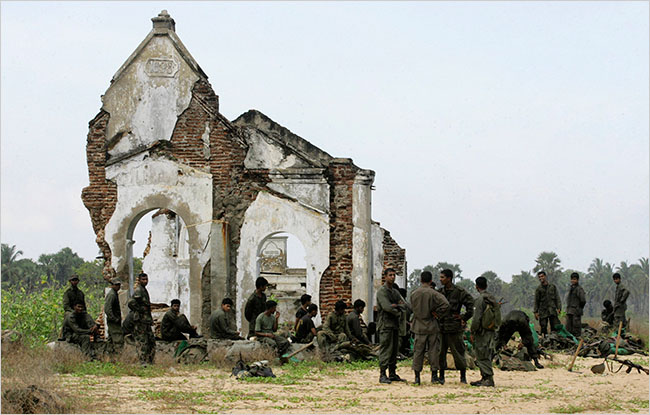Ilankai Tamil Sangam29th Year on the Web Association of Tamils of Sri Lanka in the USA |
|||||
 Home Home Archives Archives |
UN Leads Evacuation from Sri Lankaby Somini Sengupta, The New York Times, January 30, 2009
CALCUTTA — Amid mounting international criticism of Sri Lankan government forces and the Tamil Tiger rebels, a United Nations convoy carrying more than 200 wounded civilians who had been trapped in the fighting crossed into safety on Thursday, the United Nations said. The evacuation was followed by a promise from the government to give safe passage to all those still confined behind the front line.
The International Committee for the Red Cross confirmed the evacuation and said the convoy was carrying 226 civilians, including children, who had been wounded in intense fighting over the last 10 days in and around Mullaittivu, the last rebel stronghold along the northeastern coast of Sri Lanka. An estimated 250,000 civilians are hemmed in within a dwindling wedge of rebel-held territory in Sri Lanka’s northeast, according to the Red Cross. As food stocks dwindle and fighting makes it difficult to ferry in aid, the Red Cross said in a statement Thursday, “the overall humanitarian situation remains precarious for thousands.” President Mahinda Rajapaksa of Sri Lanka late on Thursday challenged the rebel Liberation Tigers of Tamil Eelam to allow civilians to leave the combat zone, though his military has not agreed to a cease-fire. “I urge the L.T.T.E., within the next 48 hours to allow free movement of civilians to ensure their safety and security,” Mr. Rajapaksa said on the Web site of the Ministry of Defense. “For all those civilians, I assure a safe passage to a secure environment.” Those who were transported on Thursday to a government-run hospital in the town of Vavuniya might have been wounded by government shelling, though it was impossible to verify because journalists and aid workers had been barred from the combat zone. For three days, the convoy was prevented from crossing the front line by the Tamil Tigers. The breakthrough came Thursday, after aid agencies, human rights groups and the United Nations, which has been unable to evacuate some of its staff members and their dependents, issued unusually strong statements criticizing the warring parties. This week, the Geneva-based International Committee for the Red Cross, which rarely comments publicly in these kinds of situations, estimated that “hundreds of people had been killed” and scores wounded in the latest fighting, and it urged both sides to respect international humanitarian law by allowing aid workers to reach displaced people and permitting trapped civilians to leave the war zone. Sri Lanka on Thursday rejected the Red Cross statement, saying that the rebels were to blame for firing from near civilian areas and then blocking ambulances. “The fact that Geneva seems oblivious to all this suggests either willful ignorance or naïveté,” said Rajiva Wijesinha, a senior government official, writing on the Sri Lankan Ministry of Defense Web site. For several weeks, fighting has intensified between government troops and the Tamil Tigers, pushing civilians living in rebel-held areas into a shrinking corner near the northeastern coast. Mullaittivu fell on Sunday, the government announced earlier this week, insisting that in its battles with the Tamil Tigers it has carefully spared civilians. But information emerging from behind the front line challenges that claim, even as it signals that the rebels are using civilians as shields. In Asia’s longest-running war, the Tamil Tigers have fought for 25 years to carve out a separate homeland for the ethnic Tamil minority, relying on conventional ground, sea and air forces and a cadre of suicide bombers. The government has maintained that its assault on the Tamil Tigers has caused no civilian deaths and angrily rejected any criticism of its war efforts. Several prominent Sri Lankan journalists have fled the country. The Red Cross added that supplies at its emergency hospital in a village called Puthukkudiyiruppu were running out and that it was unable to cope with the 350 patients there. Amnesty International has said that reports from the war zone suggest that both sides were committing war crimes. Human Rights Watch also urged both the government and the Tamil Tigers “to abide by the laws of war, including taking all feasible precautions to minimize harm to civilians during military operations and ensuring that civilians have access to humanitarian assistance.” In a stern warning to the government on Thursday, the United Nations high commissioner for human rights, Navi Pillay, said that alongside the military gains made in recent months, “the rule of law has been undermined.” Somini Sengupta reported from Calcutta, and Mark McDonald from Hong Kong. U.N. Staff and Hospital Come Under Shelling as Sri Lanka Fights Cornered Rebels
| ||||
